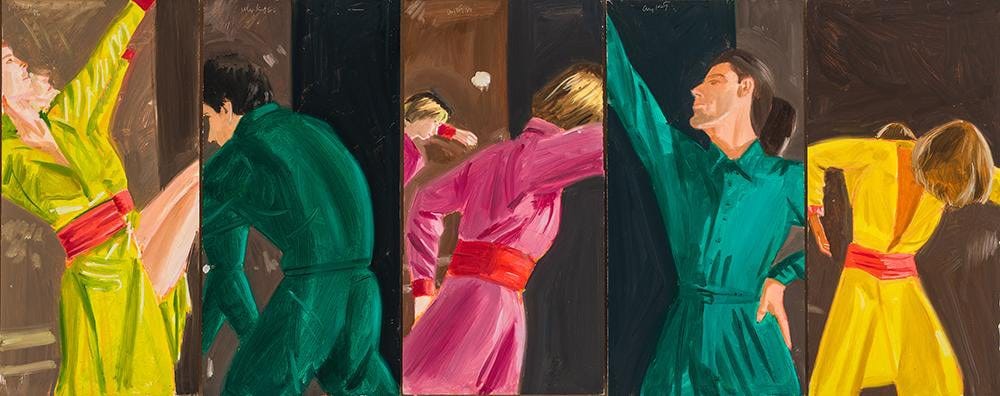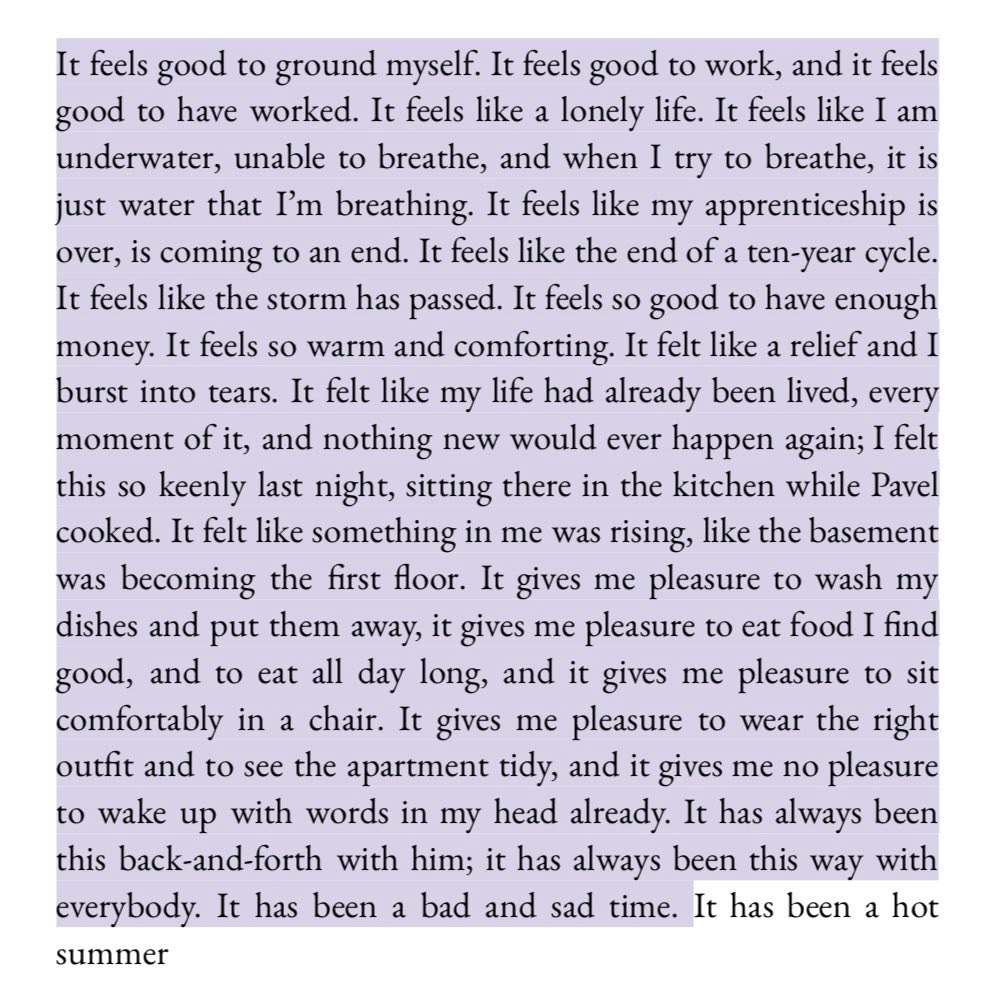how to stay in your body
writing as feeling part 2
Alex Katz, Last Look, 1986
Please please fill out the Bookbear Readership Demographic Survey if you haven’t yet!! It is much appreciated.
I’ve noticed recently that the last thing I do at night is unfurrow my brow. When I’m comfortably settled under my duvet, earplugs in, consciousness slowly deserting me, I feel my forehead gently but distinctly unclench. Every time I think: weird, I didn’t know I was holding so much tension in my face.
The Emerson line of “First be a good animal” has guided me for many years. As I start to tabulate the results of the Bookbear Readership Survey (please complete it here if you haven’t!) I’ve noticed one of the most unanimous results is that everyone says they’re more in their head than their body. I mean, we’re here on Substack so that’s not surprising, but it also makes me realize how much need we have for physicality.
I tend to feel most creative when I’m in a physical, receptive state, paying attention to sights and sensations when I’m in a new country, running my fingers over tree bark while hiking, draping my leg over someone I love. Analyzing is all well and good, but the type of writing I do generally comes from a more emotional place, and I find that it’s very hard for me to decide what to write when I’m just sitting there fretting with no inspiration.
When I’m in my body, I understand my preoccupations in a different way: like oh, this week I’ve been feeling oversocialized or, it’s really hard for me to let go of this particular anxiety. I’m able to reconnect with my intuition. Instead of feeling like a forest crowded with noises and movement, I feel like an empty plain. From The Argonauts: Many years ago, Carson gave a lecture at Teachers & Writers in New York City, at which she introduced (to me) the concept of leaving a space empty so that God could rush in. I knew a bit about this concept from my boyfriend at the time, who was big into bonsai. In bonsai you often plant the tree off-center in the pot to make space for the divine. But that night Carson made the concept literary.
That line has stuck with me for years: leaving a space empty so that God can rush in. If I’m too in my head, there’s no space left for inspiration. If you’ve ever been in an obsessive anxiety spiral, you know exactly what I mean: you get trapped into this loop that just gets tighter and tighter, less and less fulfilling. You’re not going anywhere; you’ve caving in. Being in my body feels like the opposite of that. I feel expansive and relaxed and able to notice the environment around me.
I asked in my subscriber chat what you guys said helped you stay in your body:
yoga (multiple people)
psychedelics (multiple people)
vivation breathwork - Halvard
exercising especially mobility exercise like pistol squats - A$MR Rocky
cold showers, walking an energetic dog, shrooms, 30 min breathing exercise, dancing - Laurel
The only two ways I’ve managed to get out of my head is through reading and rigorous exercise. With either, I can slip out of my mind and drift in this bodiless dark - Sagar Mehra
also a certain kind of walking/writing/photography/even conversation where I’m really really present and trying to notice everything I’m feeling without self censorship. picked up some of it up from Michael Ashcroft’s Alexander technique stuff - Henry Liu
self-pleasure along with these awesome suggestions - Shalise
finding the right. therapist is crucial. writing, yoga and breath work has also done wonders for me - hà anh
Meditation that specifically pays attention to the body. My therapist is very body-focused as well. I think, another one for me has been being in water because there you can sense the body’s movements with no weight or effort - Finn Lobsien
hiding my phone - Remy Smidt
reading good poetry - Ben
There are many more great suggestions and I can’t fit all of them here so I suggest you check out the subscriber chat.
I like that we seem to agree with each other: yoga, psychedelics, running, journaling, therapy, going to the park with my dog all help a ton. If you’re currently feeling tortured by anxiety, I recommend this as a potential day:
wake up in the morning and go for a short run
complete your workday if you have a workday to complete
do yoga at 6:30 PM
have dinner with a friend
go home and write about your feelings
read as you fall asleep
It was very gratifying to me that several of you guys said writing helps you get out of your head; Aishlin in particular mentioned “Writing exactly how I’m feeling right now to get into my body” and I too find that enormously useful and not evangelized enough. In my opinion, Sheila Heti’s Alphabet Diaries is a great example of this kind of writing (screenshot taken from this tweet):
She’s writing about what she feels, what she notices, what is. That’s the kind of writing that helps me get into my body and stay there.
This is how I might journal about anxiety, for instance: Lately it feels like everything I do is wrong. He snapped at me and then apologized. I was 27 minutes late for dinner with N. No excuse, just preoccupied. I got mad at the Waymo for being bad at merging into traffic. They left the shrimp in the pasta even though they said they wouldn’t. I didn’t want to spend the evening alone but I didn’t feel like having someone come over because the apartment is messy. I tried to watch a TV show, couldn’t stay focused. I tried to read, couldn’t stay focused.
Sometimes I write to diagnose, analyze, understand; other times I just want need to put whatever I’m feeling on paper. Some of my favorite writing to consume is diaristic for this very reason: I like the rawness of it, the spillage. You might not be able to be honest about your emotions with anyone else, but at least you can confess to yourself. Try it! It clears a lot of space.




My therapist once asked me to imagine my feeling was with me in the room, and to describe its shape and color, whether it was standing or sitting. I had such difficulty with that exercise that I realized I was in my head 99.9% of the time. It's been one of the biggest learning curves of therapy to understand that I also occupy a physical body that influences my inner world.
I never really thought about it as getting out of my head and into my body when doing exercise, but when I journal and read a good novel, I definitely get out my head and into some other space